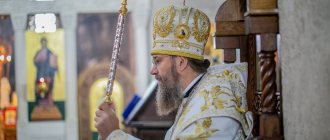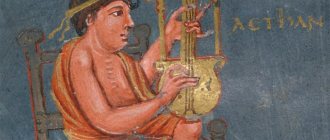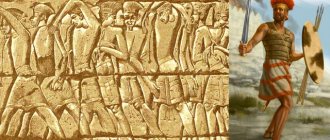Text of prayer Psalm 73
In the Orthodox tradition, Psalm 73 is performed in two translations: in Church Slavonic and Russian. The first option is read at services in churches, the second is preferably read at home for a clear understanding of the meaning of the prayer.
In Church Slavonic
In Russian
Psalm 73 Psalm
Psalter Synodal translation → Elizabethan in Russian
« 72 Psalm Psalm 73 Psalm SYN Synodal ELZMElizabethan 2 Psalm 74
Synodal translation
Elizavetinskaya in Russian
Teaching of Asaph. Why, God, rejected us forever? is Your anger kindled against the sheep of Your pasture?
What, O God, have you completely rejected? Is your anger angry against the sheep of your pasture?
Remember Your host, which You acquired from ancient times, redeemed into the rod of Your inheritance - this Mount Zion, on which You dwelt.
Remember your host, which you acquired from the beginning, which you delivered with the rod of your property, this Mount Zion, in which you dwelt.
Move Your steps towards the ancient ruins: the enemy has destroyed everything in the sanctuary.
Lift up your hand against their pride to the end, the evil enemy is in your holy place.
Thy enemies roar in the midst of Thy assemblies; We have placed our signs instead of our signs;
And they that hated thee praised themselves in the midst of thy festival: they set forth their signs, and knew them not.
they showed themselves to be like an ax lifting upward onto the intertwined branches of a tree;
as in the outcome it is superior: as in the oak grove the trees were cut down with axes
and now all the carvings in it were destroyed at once with axes and poles;
destroying its doors together with slashing and assault.
They have given Thy sanctuary to fire; They have completely desecrated the dwelling of Your name;
I have set fire to your holy place: I have desecrated the dwelling place of your name on the earth.
They said in their hearts: “We will completely destroy them,” and they burned all the meeting places of God on earth.
They decided in their hearts together: come, and let us leave all the feasts of God from the earth.
We do not see our signs, there is no longer a prophet, and there is no one with us who would know how long this will happen.
We have not seen their signs: no one has a prophet, and no one knows us.
How long, O God, will the enemy reproach? Will the enemy forever blaspheme Your name?
How long, O God, does the enemy reproach? Will the nasty one irritate your name to the end?
Why do you turn away Your hand and Your right hand? Smite them from the midst of Your bosom.
Why do you turn away your hand and your right hand from the midst of your bosom to the end?
God, my King from all eternity, who arranges salvation in the midst of the earth!
God our King, before the ages, wrought salvation in the midst of the earth.
Thou hast broken the sea by Thy power, Thou hast crushed the heads of the serpents in the water;
You have strengthened the sea with your power; you have erased the heads of serpents in the water:
You crushed the head of Leviathan, gave him as food to the people of the desert,
You crushed the head of the serpent, you gave him savagery to the Ethiopian people.
You have cut off the spring and the stream, You have dried up the mighty rivers.
Thou hast broken up the springs and streams: thou hast dried up the rivers of Itham.
Thy day and Thy night: Thou hast prepared the luminaries and the sun;
Thine is the day, and thine is the night: thou hast made the dawn and the sun.
You have established all the boundaries of the earth; You have established summer and winter.
You created all the borders of the earth: you created the harvest and spring.
Remember: the enemy reviles the Lord, and foolish people blaspheme Your name.
Remember this: the enemy has reproached the Lord, and people have provoked your name to madness.
Do not give the soul of Your turtledove to the beasts; do not forget the gatherings of your poor forever.
Do not betray the soul that confesses to you to the beast; do not completely forget the souls of your poor.
Look upon Thy covenant; for all the dark places of the earth were filled with dwellings of violence.
Look upon your covenant: for the darkness of the land has been filled with houses of iniquity.
May the oppressed not return disgraced; Let the poor and needy praise Your name.
May the humble and the wretched not return to shame: the poor and the wretched will praise your name.
Arise, O God, defend Your cause, remember Your daily reproach from the foolish;
Arise, O God, judge thy judgment: remember thy reproach, which came from the fool all day long.
do not forget the cry of Your enemies; the noise of those who rebel against You continually rises.
Do not forget the voice of your prayer book: I will take away the pride of those who hate you.
« 72 Psalm Psalm 73 Psalm SYN Synodal ELZMElizabethan 2 Psalm 74
Interpretation of Psalm 73
- Verse 1-5. God's chosen people turned away from the Lord and began to degenerate spiritually. For the Almighty, seeing His creatures moving further and further away from Him was unbearable, and He gave them another chance. The destruction of Jerusalem became a punishment for the Jews, which they must endure steadfastly. The Babylonian captivity is also a punishment that the Israelis must overcome. Everything that was dear to the Jews was destroyed.
- Verse 6-9. These lines describe how the enemy trampled the shrines of the Jews. When a fire raged in the city, blood was shed, the people did not stop thinking about the mercy of God, about his intercession. Sooner or later the shackles will fall.
- Verses 10-13. The verses contain the ardent desire of the Jews to punish the Babylonians for their deeds. Israelis sincerely believe that their enemies will be punished.
- Verses 14-18. We recall the miracles of the Lord, his supernatural power, which more than once saved the people of Israel from death. Punishment awaits everyone when they once offended the holiness of the Almighty.
- Verses 19-21. The cry of the captive people does not fade away. The author compares the enemies to animals that are deprived of God's mercy. Jerusalem will still rise, and the Jews will return to their homeland.
The author hopes that the cry of God's chosen people will reach God, and He will fall with all his might on the maddened invaders.
73:1 Teaching of Asaph. Why, God, rejected us forever? is Your anger kindled against the sheep of Your pasture?The teaching of Asaph is not just a song. Asaph understands that the people of God at the moment (the destruction of Jerusalem) are rejected by God for numerous sins. But he, like everyone who hopes for God’s mercy, does not want to think that this rejection is forever.
73:2,3 Remember Your host, [which] You acquired from ancient times, redeemed into the scepter of Your inheritance - this Mount Zion, on which You rejoiced. 3 Move your steps towards the ancient ruins: the enemy has destroyed everything in the sanctuary.
Asaph asks God to remember that Israel is His people, and the temple in Jerusalem is His dwelling place. And now all this is in desolation and ruins. Why would God remember all this? To arouse jealousy for His House, in which the pagans began to rule.
73:4 Thy enemies roar in the midst of Thy assemblies; they put up their signs instead of [our] signs;
Interestingly, here Asaph is talking about enemies roaring AMONG THE ASSEMBLY of God's people, not just in the middle of the temple building in Jerusalem, although they have installed their objects in the temple building. Why did he say that? Because it is not the building of the temple that is valuable to God, but His servants; without people, God does not need a temple on earth, for the heavens of heavens cannot accommodate it. People are what interests Him at all times and their attitude towards Him.
73:5-8 they showed themselves to be like an ax lifting upward onto the intertwined branches of a tree; 6 And now all the carvings in it were destroyed at one time with axes and poles; 7 We have given Your sanctuary to fire; They have completely desecrated the dwelling of Your name; 8 They said in their hearts, “We will completely destroy them,” and they burned all the meeting places of God on earth.
Everything that had been built over many years with diligence and care in the temple was all destroyed in an instant, the tree of Judah was cut down at the roots and all the meeting places of God’s people were burned. As we see, worshipers of Jehovah gathered not only in the temple even before the destruction of Jerusalem. Most likely, in all the villages of Israel there were places like synagogues, where the men of Israel gathered to listen to the word of God from the spiritual teachers of Israel - 2 Prov. 17:9.
73:9 We do not see our signs, there is no longer a prophet, and there is no one with us who would know how long [this will be].
Asaph laments the fact that there are none of His prophets left among Jehovah’s people who could clarify the situation and say what will happen to them and how long all this will last.
This is how God punishes, depriving His people of the opportunity to know the truth about God’s intentions through His messengers. 73:10 How long, O God, will the enemy reproach?
Will the enemy forever blaspheme Your name? Therefore, Asaph turns to God directly with the question, how long will God watch how the work of His hands is trampled, thereby blaspheming His name? (they say, what kind of God is this if the Babylonian king defeated His people?).
73:11-15 Why do you turn away Your hand and Your right hand? From the midst of Your bosom strike [them]. 12 O God, my King from everlasting, who arranges salvation in the midst of the earth! 13 You split the sea with Your power, You crushed the heads of the serpents in the water; 14 You crushed the head of Leviathan and gave him as food to the people of the desert. 15 You have cut off the spring and the stream, You have dried up the mighty rivers.
He asks to put an end to all this disgrace, because he knows that God can arrange salvation for his people at any time and from anything: the sea will split, and the crocodiles will submit to man, and the rivers will dry up, if God wants. Here Asaph dwells on the power and strength of Jehovah, capable of performing miracles of salvation in the universe.
73:16,17 Thy day and Thy night: Thou hast prepared the luminaries and the sun; 17 You have established all the boundaries of the earth; you have established summer and winter.
Asaph undoubtedly recognizes the greatness of God as the Lord over both day and night, and over the luminaries of the earth and over the seasons - over all His creation.
73:18,19 Remember: the enemy reviles the Lord, and foolish people blaspheme Your name. 19 Do not give the soul of your turtledove to the beasts; do not forget the gatherings of your poor forever.
And he calls on God to also remember one more of His creations – Israel. Asaph asks God not to leave his people forever, calling this society of people turtledoves and wretched, and their enemies beasts. The animal image, by the way, runs throughout the Bible as the personification of the enemies of God and the assistant of the devil - Rev. 13:1-3.
73:20,21 Look upon Thy covenant; for all the dark places of the earth were filled with dwellings of violence. 21 Let not the oppressed return disgraced; Let the poor and needy praise Your name.
Asaph asks God to remember His covenant with His people in order not to let this people perish completely, for the violence and dominance of God’s enemies is throughout the entire land of Israel, a little more and there will be nothing left of God’s people and there will be no one to praise the name of Jehovah.
73:22,23 Arise, O God, defend Your cause, remember Your daily reproach from the foolish; 23 Do not forget the cry of Your enemies; the noise of those who rebel against You continually rises.
Israel is the work of God, and therefore it is unsuitable for the enemy to trample on it and for a fool to revile this work of God’s hands. Asaph asks God to pay attention to this.
Asaph is troubled by the fact that the noise of those rebelling against Jehovah is constantly intensifying, which means that the enemy’s camp is growing stronger, and the name of God is becoming more and more reproached. This is unacceptable given that Israel has a heavenly protector.
How is Christian Psalm 73 interpreted?
no comments
The text of Orthodox Psalm 73, like the previous one, was written by the Israeli performer of religious songs Asaph. Its content is quite sad: the author appeals to God with sorrowful reproach, asking for what sins He abandoned His chosen people, turned away from them, throwing them to be torn to pieces by their enemies.
The interpretation of Psalm 73 suggests that it describes the capture and destruction of Jerusalem by King Nebuchadnezzar - an event during which the entire city and its surroundings were burned, the main shrine of the Jews - the Jerusalem temple - was destroyed, and the Jewish people, almost for the first time in history, were left without a prophet.
When is it recommended to read the prayer Psalm 73?
In the text of Psalm 73, Asaph describes the attitude of the enemies that befell the Jews after the conquest of Nebuchadnezzar: his people attended the Jewish meetings, disturbing their peace of prayer and atmosphere of solitude. The enemy refused to see religious and educational significance in them, suspecting political motives and conspiracies. At the end of Psalm 73, Asaph asks the Lord to once again return His mercy to the oppressed and shamed people. Reading and listening online to Psalm 73 in Orthodoxy was customary in cases of enemy siege, so that God would preserve the inhabitants of the village.
Listen to the video of the Orthodox prayer Psalm 73 in Russian
Read the church text of Psalm 73 in Russian
Teaching of Asaph.
Why, God, rejected us forever? is Your anger kindled against the sheep of Your pasture? Remember Your host, which You acquired from ancient times, redeemed into the rod of Your inheritance - this Mount Zion, on which You rejoiced. Move Your steps towards the ancient ruins: the enemy has destroyed everything in the sanctuary. Thy enemies roar in the midst of Thy assemblies; We have placed our signs instead of our signs; they showed themselves to be like an ax lifting upward onto the intertwined branches of a tree; and now all the carvings in it were destroyed at once with axes and poles; You have given Your sanctuary to fire; They have completely desecrated the dwelling of Your name; They said in their hearts: “We will completely destroy them,” and they burned all the meeting places of God on earth. We do not see our signs, there is no longer a prophet, and there is no one with us who would know how long this will happen. How long, O God, will the enemy reproach? Will the enemy forever blaspheme Your name? Why do you turn away Your hand and Your right hand? Smite them from the midst of Your bosom. God, my King from all eternity, who arranges salvation in the midst of the earth! Thou hast broken the sea by Thy power, Thou hast crushed the heads of the serpents in the water; You crushed the head of Leviathan, you gave him as food to the people of the desert, the Ethiopians; You have cut off the spring and the stream, You have dried up the mighty rivers. Thy day and Thy night: Thou hast prepared the luminaries and the sun; You have established all the boundaries of the earth; You have established summer and winter. Remember: the enemy reviles the Lord, and foolish people blaspheme Your name. Do not give the soul of Your turtledove to the beasts; do not forget the gatherings of your poor forever. Look upon Thy covenant; for all the dark places of the earth were filled with dwellings of violence. May the oppressed not return disgraced; Let the poor and needy praise Your name. Arise, O God, defend Your cause, remember Your daily reproach from the foolish; do not forget the cry of Your enemies; the noise of those who rebel against You continually rises.
Orthodox Psalter, text of Psalm 73 in Church Slavonic
What, O God, have you rejected to the end? Is your anger angry against the sheep of your pasture? Remember your host, which you acquired from the beginning, which you delivered with the rod of your property, this Mount Zion, in which you dwelt. Lift up your hand against their pride to the end, O evil enemy is in your holy place. And those who hate you praised themselves in the midst of your holiday; she laid down her own sign, and did not understand it. as in the outcome it is higher; like in an oak grove, the trees cut its doors with axes, and destroyed it with a slash and a slash. I lit your holy place with fire; I have desecrated the dwelling place of your name on earth. Having decided in your hearts to kill them together; Come, and let us remove all the feasts of God from the earth. Their signs are not visible; No one has a prophet, and no one knows us. How long, O God, does the enemy reproach? Will the nasty one irritate your name to the end? Why do you turn away your hand and your right hand from the midst of your bosom to the end? God our king, before the ages, wrought salvation in the midst of the earth. You have established the sea with your power; you erased the heads of the serpents in the water; you crushed the head of the serpent, you gave him savagery to the people of Ethiopia. You have broken up these sources and streams; You dried up the rivers of Itham. Yours is the day, and yours is the night; you have accomplished the dawn and the sun. You created all the ends of the earth; You and I created the harvest and spring. Remember this; the enemy has reproached the Lord, and people have provoked your name to madness. Do not deliver over the soul that confesses to you to the beasts; do not forget your poor souls to the end. Look upon your covenant; for the land of wicked houses is filled with darkness. May the humble not return disgraced; the poor and wretched will praise your name. Arise, O God, judge thy judgment; Remember your reproach, even from the fool all day long. Do not forget the voice of your prayer book; I will take away the pride of those who hate you.
References
Psalm 73
related projects on Wikipedia
- Media from Wikimedia Commons
- Quotes from Wikiquote
- Texts from Wikisource
- Data from Wikidata
- Asaph (2007), Alter, Robert (ed.), The Book of Psalms: Translation with Commentary
and Others, New York and London: W. W. Norton & Co, pp. 252–56. - W. Brueggemann, The Message of Psalms
(1984). - J. Clinton McCann, Jr., A Theological Introduction to the Book of Psalms: The Psalms as Torah
, Abingdon Press, 2011, 144.
Analysis
According to Walter Brueggemann (1984), “in the canonical structure of the Psalter, Psalm 73 occupies its central place and plays a decisive role. Even if the Psalm is not at the literal center, I propose that it is the theological as well as the canonical center."[2] This was Martin Buber's favorite psalm, who said of it: "What attracts me so much in this poem composed of description, report and confession, and attracts me more and more the older I get? I think this is what the person here is communicating how he has reached the true meaning of his life experience and that this feeling directly relates to the eternal."[3]




